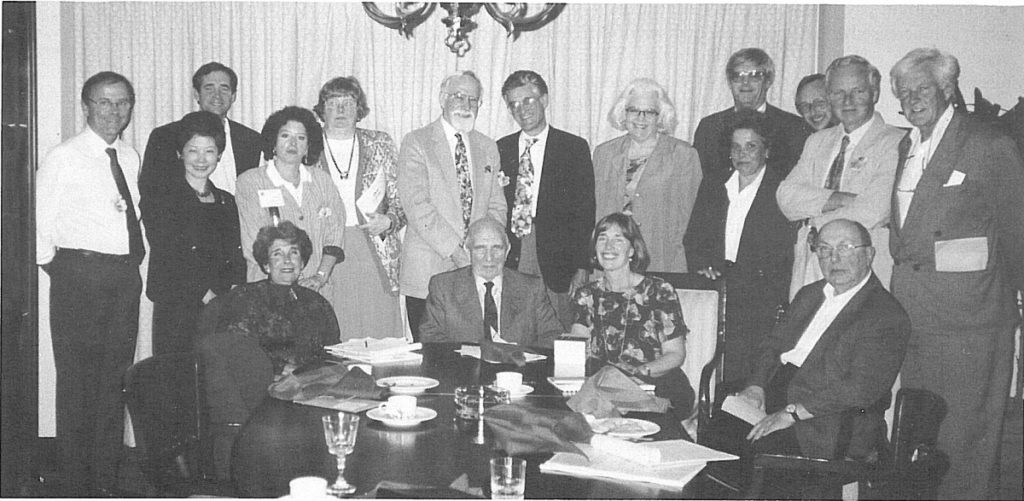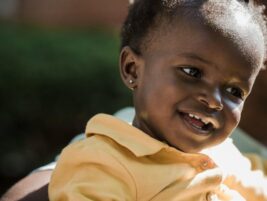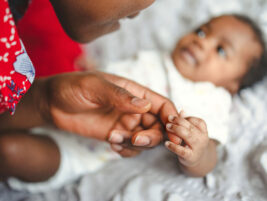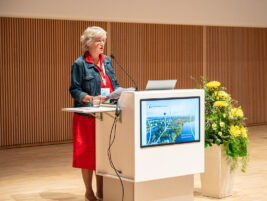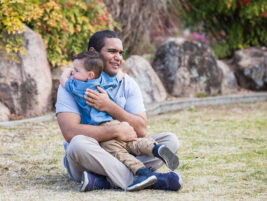In 1992, the World Association for Infant Psychiatry and Allied Disciplines (WAIPAD) (originally established in 1980, in the USA) and the International Association for Infant Mental Health (IAIMH) (created by the Michigan Association for Infant Mental Health in the USA) merged into one organisation: the World Association for Infant Mental Health (WAIMH).
In 1993, WAIMH produced its first newsletter, called WAIMH’s News (Volume 1, Number 1, March 1993).
A photo of the WAIMH Board and Executive Committee was featured and includes the first Editor-in-Chief of WAIMH’s newsletter; Charles Zeanah.
At this time, the ethos of the new publication had been established and was clearly outlined below in the inaugural Welcome to WAIMH’s World address, by Hiram E Fitzgerald (WAIMH Executive Director 1993-2008). In this address, the stage was set for this publication to be member-led, and for members to experience ownership of the publication. Furthermore, in keeping with this participatory approach, in this first edition newsletter, a call was made to all members to be part of considering a name for the newsletter.
WELCOME TO WAIMH’S WORLD
Welcome to the first edition of the WAIMH Newsletter! Under the capable and dynamic editorship of Charley Zeanah, the WAIMH Newsletter will bring you regular features, clinical case studies, letters to the Editor, news and views about infant mental health, worldwide training and educational opportunities, and the latest happenings among WAIMH’s worldwide Affiliate Associations. We want this to be your newsletter. Please help! First, we need a name. So, participate in the NAME THE NEWSLETTER CONTEST! Rules: Deadline for receipt of suggested names: SEPTEMBER 1, 1993. The winner will receive a free subscription for the 1994 Infant Mental Health Journal. Send your nominations to the WAIMH Executive Office, 2 Paolucci Building, Michigan State University, East Lansing, MI USA 48824-1110. Second, we need articles. Use your newsletter to communicate with other infant mental health specialists around the world. Ever want to be a reporter? This is your opportunity to report on scientific, clinical, and outreach issues related to infant mental health. Send your contributions to the editor. So, in the meantime, sit back, relax, and enjoy reading our first edition!
Hiram E. Fitzgerald, Executive Director, 1993
As a result of this open call out for a name, WAIMH’s World was named “The Signal”. WAIMH’s newsletter was published under the new name “The Signal” in Volume 1, Number 3, July -September 1993. The name is credited to Emily Fenichel, who won the WAIMH newsletter naming competition. At the time Emily was Associate Director of Zero to Three and was also the Editor of the Zero to Three Journal from 1992 – 2006. The rationale for her winning suggestion was published in the same issue as per below.
Name the Newsletter Winner
Emily Fenichel of the National Center for Clinical lnfant Programs in Washington, D. C. has won the “Name the Newsletter” contest with her entry: The Signal! Actually, Emily submitted so many possibilities that it was almost destined that one would be selected by the committee. A signal is a sign, an act, behavior, occurrence, that intends to communicate. Thus a signal is a basic act of communication. All aspects of human discourse involve the emission and interpretation of signals, just as all infant mental health work involves the emission and interpretation of signals. The baby’s cry communicates hunger, pain, or general distress. Parents either differentiate these cries and respond appropriately, or they fail to understand the meaning conveyed by different cries and respond inappropriately. The infant’s smile or gaze communicates pleasure or attentiveness. Parental vocal behavior modulates in order to simplify the information that the baby must process, and the infant seems predisposed to lock onto maternal vocalizations shortly after birth, if not before. All human communication involves the emission, transmission, and interpretation of signals.
The major reason d’etre for the WAIMH newsletter is communication; worldwide networking for individuals from many disciplines and many cultures who share a concern for the optimal development of infants and their families. Thus, it seemed quite appropriate to name the WAIMH newsletter, THE SIGNAL. The title has the added advantage of being nearly the same in several different languages. Thanks Emily for the recommendation. For your good work, WAIMH is happy to provide you with a complimentary membership and subscription to the Infant Mental Health Journal for 1994 (The Signal, 1993, Vol 1, No. 1).
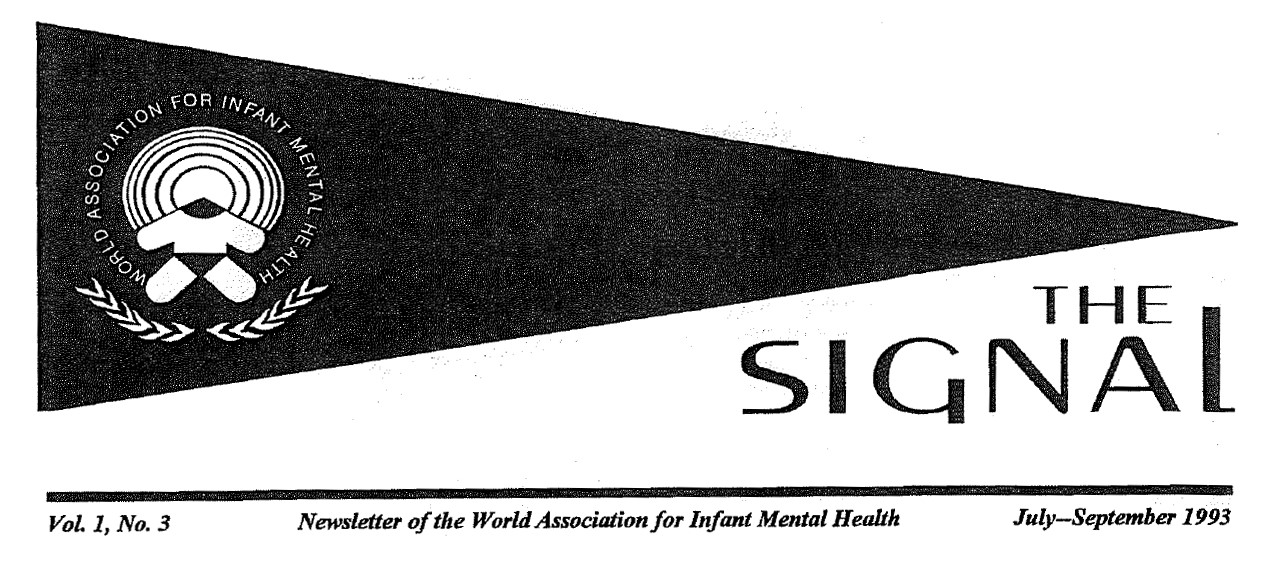
The Signal, as a paper and post newsletter was published quarterly, each year. Throughout this time, papers were published on a wide array of infant mental health-related topics such as the relationship between parents and infants, caregiving relationships, and service development within infant mental health.
The Signal, Michigan State University and Michigan Association for Infant Mental Health
The WAIMH Signal was supported by an office at the Michigan State University, by Associate Provost Hiram Fitzgerald and the University Outreach and Engagement. This close connection between WAIMH and the Michigan Association for Infant Mental Health (MI-AIMH) (Michigan Association for Infant Mental Health (mi-aimh.org)) has endured across the past three decades.
The Infant Mental Health Journal (IMHJ), Michigan Association for Infant Mental Health, and WAIMH
While The Signal began as a WAIMH newsletter, the Infant Mental Health Journal (IMHJ) was created by the Michigan Association for Infant Mental Health (MI-AIMH), published in 1980 as a peer-reviewed, quarterly journal, and copyrighted by the Michigan Association for Infant Mental Health. At the time, it was the first journal with an interdisciplinary research and clinical focus on infancy, parenthood, and infant mental health. Jack Stack, MD, an MI-AIMH member, was the first Editor-in-Chief, followed by Hiram Fitzgerald, Joy Osofsky, and Paul Spicer. The current Editor-in-Chief is, Holly Brophy-Herb. The Editorial Board is made up of distinguished WAIMH and MI-AIMH members from around the world. The IMHJ is published bi-monthly by Wiley and can be accessed here: Infant Mental Health Journal – Wiley Online Library. It is the official peer-reviewed journal publication of WAIMH and, by special agreement with MI-AIMH, members of WAIMH can subscribe to the IMHJ and receive a reduced WAIMH member subscription rate with access to the Wiley database of the electronic journal.
WAIMH Office from its base at Michigan State University (USA) to Pirkanmaa Hospital District (Child Psychiatry) and Tampere University (Finland)
In 2008, the WAIMH Central office moved from Michigan (USA), where WAIMH had been hosted by Michigan State University, to Tampere (Finland), where it has been, and continues to be hosted by Pirkanmaa Hospital District (Child Psychiatry) and Tampere University (Faculty of Medicine and Life Sciences until 2019, and then form 2020 onwards by Innovation Services and Partnerships). These two generous and supportive institutions have been pivotal in the growth and development of The Signal and WAIMH Perspectives in Infant Mental Health.
Beginning to move from a print to a digital online publication
In July 2010, with the evolving technology and digital communications development, WAIMH became a coloured publication with a new layout, that was oriented to both print and online readers. Minna Sorsa and the WAIMH Central Office together with Executive Director Palvi Kaukonen were instrumental in implementing this change together with graphic designer Adina Huda at Michigan State University and later the digital version together with Santeri Niemi at Differo corporation.

The Signal is renamed WAIMH Perspectives in Infant Mental Health
In 2012, with leadership from Deborah J Weatherston as Editor-in-Chief, and Hiram E Fitzgerald as Co-Editor, The Signal became known as WAIMH Perspectives in Infant Mental Health (Volume 20, No. 3-4, July – December 2012). The underpinning rationale for this name change can be read in Box 1 and includes the recognition of and headlining of infant mental health as a global practice and research network and community. The rationale also captures the global reach of perspectives in infant mental health across cultures and contexts, shifting the primary function of the publication from a newsletter toward a global community of practice-oriented journal.
Box 1. The Signal is renamed WAIMH Perspectives in Infant Mental Health.
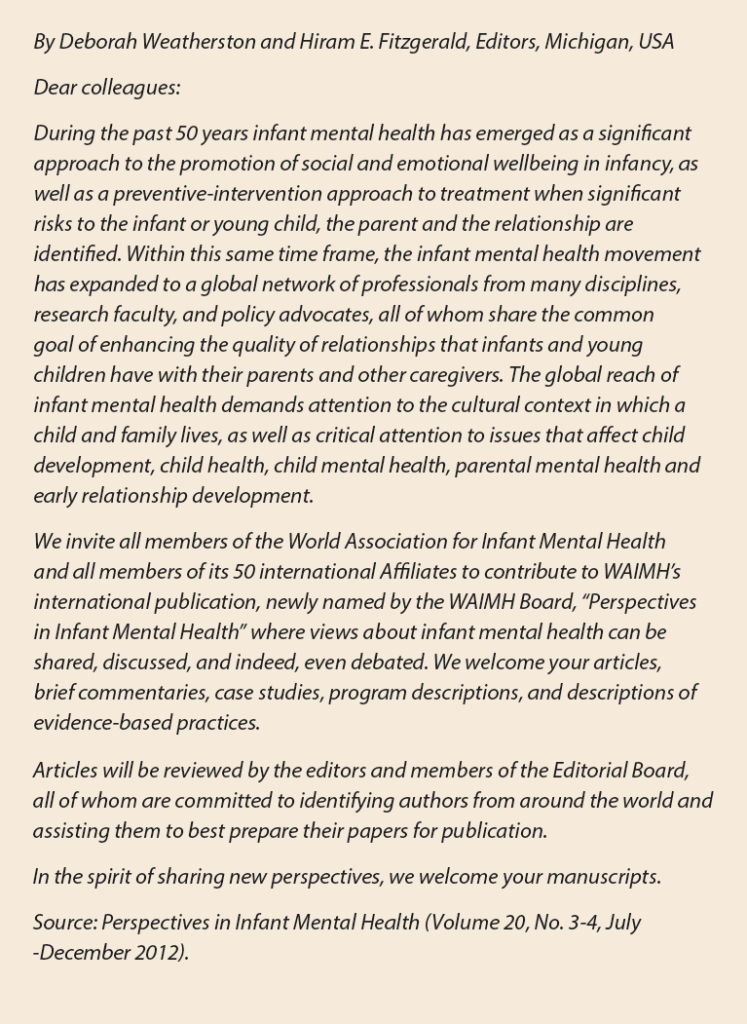
The Signal and Perspectives in Infant Mental Health Editorial Teams
From 1993 to the current day, The Signal and WAIMH Perspectives in Infant Mental Health have experienced notably stable and long-standing service from each Editor and their many Co-Editors and Assistant Editors. For a full list of editors, Neea Aalto in the WAIMH Office has compiled a list of all editors from 1993 to 2021 and access to this list can be located at the following link: https://perspectives.waimh.org/editorial-staff/
Production Editors
Central to The Signal and WAIMH Perspectives in Infant Mental Health has been and continues to be the WAIMH support staff, the Production Editors:
Melanie Smith (1/1993 – 3/2000) (USA)
Tina Houghton (4/2000 – 3/2008) (USA)
Minna Sorsa (1-2/2007 – current) (Finland)
Neea-Leena Aalto (3/2021-) (Finland)
Editors-in-Chief of The Signal and Perspectives in Infant Mental Health
The Signal
Charles Zeanah (1993-2000) (USA)
Paul Barrows (2001-2006) (UK)
Tina Houghton, Dolores Fitzgerald, and Carla Hills 2006 (3-4/2006) (USA)
Miri Keren (2007 – 2011) (Israel)
The Signal and WAIMH Perspectives in Infant Mental Health
Deborah J Weatherston (2012-2018) (USA)
WAIMH Perspectives in Infant Mental Health
Maree Foley (2019 – current) (New Zealand and Switzerland)
The Signal and WAIMH Perspectives in Infant Mental Health: Content analysis 2007 – 2017
In 2017, all materials between 2007 and 2017 were digitized and published as text, alongside the original PDF versions. Therefore, at this time, the Signal and the Perspectives in Infant Mental Health archive included all texts from 2007, which in turn could be easily shared on all social media channels. See: Perspectives Archive – Perspectives (waimh.org)
Minna Sorsa (Production Editor, Administrative Assistant) and Anna Hemmi (Administrative Assistant) in the WAIMH Central Office, analysed all of The Signal and WAIMH Perspectives in Infant Mental Health texts that had been published between 2007 and 2017. The total number of papers was 334. The authors represented 28 countries, including from the United States (n=102), Finland (n=36), Israel (n=42), France (n=26), Switzerland (n=20), New Zealand (n=17), Canada (n=16) and South Africa (n=16). Figure 1 below, represents overall content themes between 2007 and 2017, highlighting high-frequency themes such as infant-mental health services, the caregiving context, and parent-infant interaction.
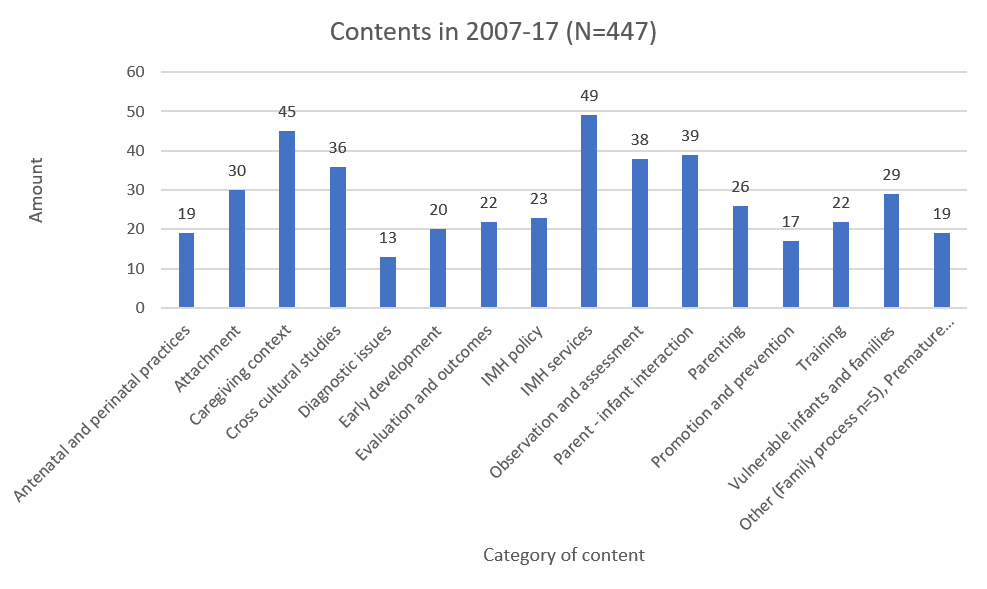
WAIMH Perspectives in Infant Mental Health becomes an online publication
With ongoing leadership from Deborah J Weatherston as Editor-in-Chief, in 2017 the publication went completely digital. Building on the collective work of previous editors and editorial teams, and in conjunction with advances in digital technology, the publication was launched into the digital arena.
This development was part of a wider WAIMH initiative that had been in process between 2014 and 2017. During the time, a thorough social media strategy, coordinated by the WAIMH Central office (led by Minna Sorsa in collaboration with Differo social media company), was developed together with the Board of Directors of WAIMH and consultation with WAIMH members. This process included reviewing and developing the design of a WAIMH social media presence, including its communication with members and its overall global outreach.
The changes constituted the increased use of photos within all WAIMH communications and including WAIMH Perspectives in Infant Mental Health publications that were now shared via the WAIMH website, and for example, on Facebook and Twitter, with the introduction of a new hashtag for social media: #PerspectivesIMH, with #WAIMH and #IMH utilized alongside.
Full online access to all current and past publications
As of 2020, there was ongoing development and refinement of the WAIMH Perspectives in Infant Mental Health website, led by Minna Sorsa (Senior Administrator) and Sari Miettinen (Administrative Assistant) in the WAIMH office. For example, all full issues of The Signal and WAIMH Perspectives in Infant Mental Health were archived. Past issues of The Signal (1993 – 2011) could be accessed online. The Signal 1993 to 2006 is available in PDF format. The Signal papers from 2007 and all issues of WAIMH Perspectives in Infant Mental Health (2012 – current) were now also available as PDF and text. In addition, using the categories as stated above, to date all articles across all the issues from 2006 were now tagged to help readers quickly and easily locate articles by theme. The next step is to tag all papers from 1993.
Google analytics and readers interests
From April 2017 onwards, with the benefit of google analytics, it became possible to see what readers are reading. For example, see Figure 2, which upon further analysis indicates there is high reader interest in original peer-reviewed articles. The google analytics analysis helps the publication to as much as possible to publish different types and content-based material that endeavours to meet the changing and evolving needs of the readers; an ethos that has been present from the outset. It also shows readership growth over time (See Figure 3).
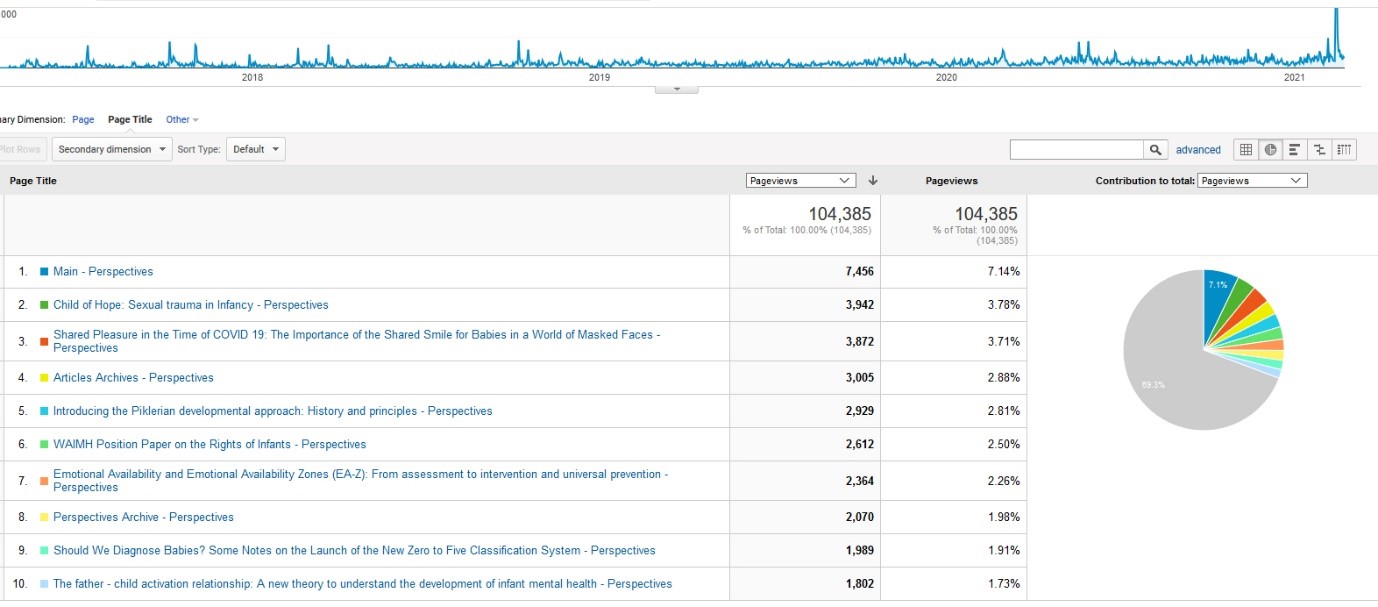
The number of readers has constantly risen, year-on-year, and in 2020, WAIMH Perspectives in Infant Mental Health had 37,700 page views.
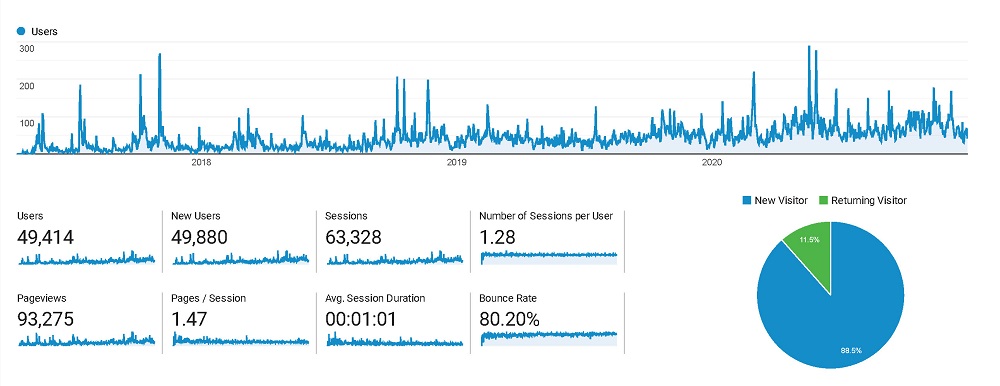
Between April 2017 and December 2020, WAIMH Perspectives in Infant Mental Health had 49,880 visitors, with 93,275 page views. Readers are most frequently in the age group 25-35 years (33.5%), and secondly in the age group 18-24 years (27.5%). These analytics reflect the importance of the publication, and its social media platforms for new and emerging infant mental health professionals, both as WAIMH members and within the global infant mental health community of practice and research, inclusive of families with young children. Of note, most readers in 2020 come from western countries: the United States (44%), Australia (10%), Great Britain (5%), Canada (4%) and Finland (3%). Extending the reach, accessibility, and applicability is an ongoing goal of the publication.
The most popular papers in Signal/Perspectives IMH since April 2017 – December 2020 are the peer-reviewed papers: Child of Hope: Sexual trauma in Infancy, by Astrid Berg (published 05/15/2008) with 3,332 reads; Introducing the Piklerian developmental approach: History and principles by Anna Tardos (published 12/15/2010) with 2,745 reads; and Emotional Availability and Emotional Availability Zones (EA-Z): From assessment to intervention and universal prevention by Hannah Saunders et al. (published 04/21/2017) with 2,277 reads. Also, the WAIMH Paper on the Rights of Infants has indicated that this is an important area of enquiry for readers as the text has been accessed over 2,533 times.
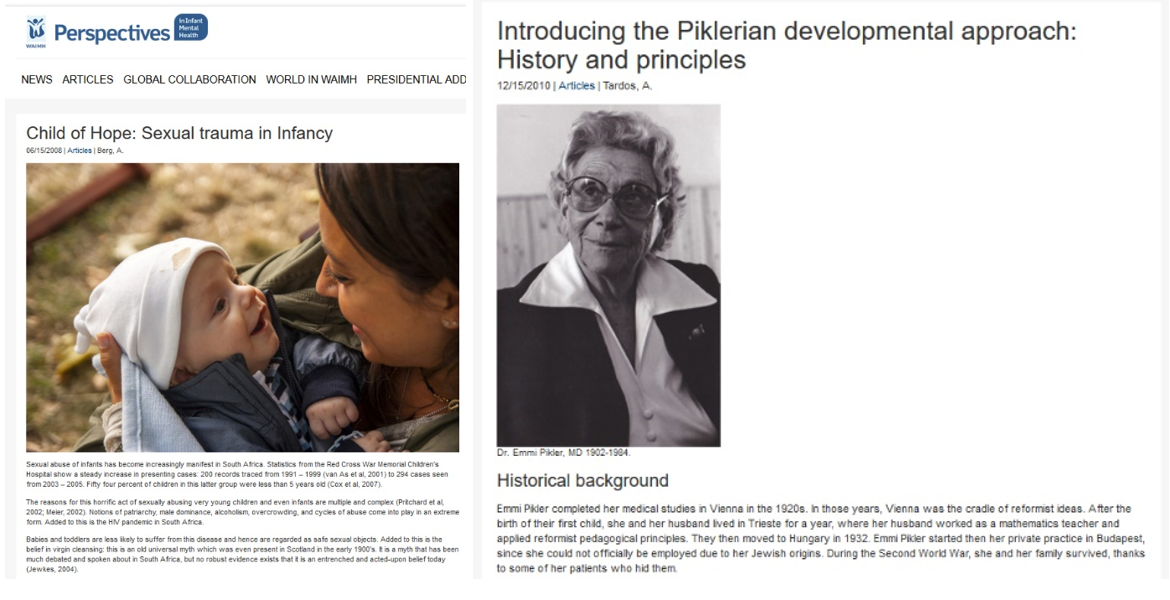
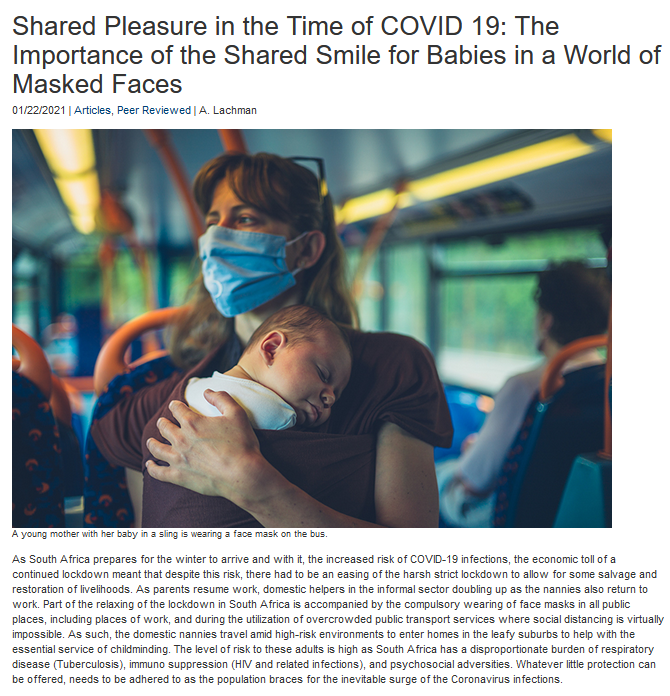
As we now move into a new cycle of data analytics, at the time of writing, we can report that the paper within The Voices of COVID-19 WAIMH Perspectives in Infant Mental Health (Special issue), Shared Pleasure in times of COVID 19: The Importance of the Shared Smile for Babies in a World of Masked Faces, by Anusha Lachmann (published 01/22/2020) has recorded 3,330 reads.
Recent developments within the publication
The Signal and WAIMH Perspectives in Infant Mental Health continues to evolve.
Further recent developments include a formal blind peer-review process for selected papers. This was first implemented, with 2 papers in the Fall/Winter issue 2019. There has also been a shift from four issues a year to three issues a year to balance the online and regular publishing process between full issues.
In 2019 the publication also introduced the intern editor program, with Salisha Maharaj from South Africa as our inaugural intern editor. The internship program is specifically for people who are currently engaged in an infant mental health training programme and who are new to the field. The over-arching goal is to leverage WAIMH Perspectives in Infant Mental Health as a base from which to: get to know new members; provide opportunities to engage with the wider IMH community beyond one’s local area, and also learn and understand from new members about what they are seeing and noticing in our field. The aim is to grow this initiative so that interns at any one time represent different regions across the globe. This not only reflects WAIMH’s outreach goals but also supports new members getting to know each other through sharing in the work of WAIMH.
Continuing to build the relationship across WAIMH Perspectives in Infant Mental Health and the Infant Mental Health Journal, in 2020, a joint initiative was established that involves featuring IMHJ articles that especially draw attention to themes in practice with very young children/families. The IMHJ editor selects published papers, engages with Wiley for publication permission and invites authors to consider if they would be like to be part of this initiative. The first paper featured in this new initiative was by Rachel Ransley, Michelle Sleed, Tess Baradon and Peter Fonagy (UK): “‘What support would you find helpful?’ The relationship between treatment expectations, therapeutic engagement, and clinical outcomes in parent–infant psychotherapy”
COVID-19 response
In response to COVID-19, the WAIMH Perspectives in Infant Mental Health team collaborated with the IMHJ Editor-in-Chief Holly Brophy-Herb, and WAIMH Board member and Associate Editor Jane Barlow, in a shared initiative: Infant and Early Childhood Mental Health in the Context of the COVID-19 Pandemic. The goal of the initiative was to capture and share, as quickly as possible, the experiences of infants, toddlers, young children, families, and practitioners around the globe. In disseminating these papers, the aim has been to provide a platform of infant mental health informed research to inform and guide additional research and applied practices and services, such as telehealth and telemedicine in infant and early childhood mental health contexts.
As a result, WAIMH Perspectives in Infant Mental Health published a special issue in December 2020, The Voices of COVID-19 WAIMH Perspectives in Infant Mental Health, which included a series of thirteen papers, captured the reflections and early research endeavours of scholars from Australia, Chile, Portugal, South Africa, and the United States. The papers featured case studies and qualitative studies, bringing into view, the voices and lived experiences of infants, young children, families, and practitioners, during the early stages of the COVID-19 pandemic. The second part of this initiative has resulted in a forthcoming special issue of the Infant Mental Health Journal, due for publication in early 2022. This special issue includes fourteen papers representing scholars and research from Chile, Brazil, Canada, and the United States.
Furthermore, and in conjunction with the Perspectives team, Sari Miettinen, from the WAIMH office was instrumental in setting up the COVID-19 WAIMH web page.
The Signal and WAIMH Perspectives in Infant Mental Health E-book project
Throughout 2020-2022 an ebook project has been in motion to celebrate 30 years of this publication. The ebook will contain thematic summaries of published material across both publications from 1993-2021. This project team is being led by Miri Keren and includes Deborah J Weatherston, Maree Foley, Kaija Puura, and Patricia O’Rourke.
Free open access to all publications since 1993
The Signal and WAIMH Perspectives in Infant Mental Health is a free and open access online publication. While the publication is free and open-source, there is a short member-only access time access to each new publication before the material becomes open source.
All publications since 1993, are now archived on the WAIMH website on the WAIMH Perspectives in Infant Mental Health page.
The link is here: https://perspectives.waimh.org/perspectives-archive/
In addition, past articles are also available online in text format (from 2007), which in turn can be shared: https://perspectives.waimh.org/
Moving forward
The Signal and WAIMH Perspectives in Infant Mental Health both represent a team within WAIMH that aims to build and sustain connections within the WAIMH community, and from which has evolved, and continues to evolve full issue publications, special issues, and a growing social media presence, all oriented towards the aims and mission of WAIMH.
Moving forward and continuing to grow from its roots in The Signal, WAIMH Perspectives in Infant Mental Health welcomes submissions from colleagues across our diverse field that challenge the way we think about infants, families, culture, and community, and offer fresh perspectives on policy, research, and practice.
On behalf of WAIMH,
To every baby and family and community who have shared their journey with us,
To every editor and contributor,
To the host institutions of Michigan State University and Pirkanmaa Hospital District (Child Psychiatry) and Tampere University (Faculty of Medicine and Life Sciences 2008-2019 and from 2020, the Innovation Services and Partnerships),
To every reader of The Signal as a paper and post-publication, and the more recent
WAIMH Perspectives in Infant Mental Health readers,
Thank you.
Authors
Maree Foley, Switzerland
Minna Sorsa, Finland
Neea Aalto, Finland
Deborah J Weatherston, USA


